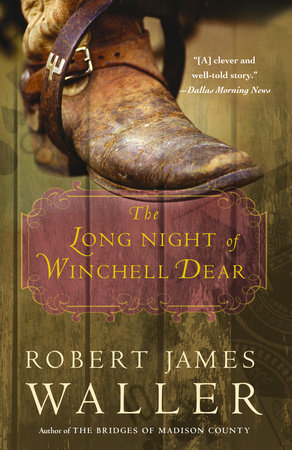The Long Night of Winchell Dear Reader’s Guide
By Robert James Waller


1. Do you think Winchell wanted to be a professional gambler? On page 133, he corrects Lucinda, saying he’s not a “true-to-life gambler” but “I play poker for a living.” Is there a difference?
2. Are there similarities between the lonely Texas landscape and the characters, whose lives are connected without them hardly ever interacting? How do you think their lives would cross each other’s if the setting were different? Would it?
3. On page 26, Marty is described as, “wishing he’d studied the moon more than he had during a messy life, which in a way Marty couldn’t grasp seemed to be disappearing while he lived it.” What is the difference between Marty and the driver? Is there a reason the driver isn’t given a name? What does that suggest about both Marty and him?
4. When Winchell is fifteen and his father describes the life of a card player, he says, “the cards are something altogether different . . . what I’m trying to get across is the notion of independence” (page 35). Is there a freedom to Winchell’s life that is found through playing poker? Does money influence Winchell’s playing as much as this idea of freedom? What drives the other players more? What does Winchell think about that?
5. In teaching Winchell the basics of poker, Fain discusses the nature of cheating and greed with him. What do you think compels the characters in this novel to cheat or be greedy? Is it simply a desire for more money and possessions, or is there something more that they want? Is this attainable to them?
6. What do you think about Sonia deceiving her employer? What do you think Winchell would do if he knew about her deceit? How would his treatment of her differ from his treatment of Peter Long Grass if he knew the truth? Would it?
7. On page 38, Winchell’s father says to him, “Life’s enough of a gamble all by itself without intentionally putting yourself in situations you can’t control.” Does this contradict the lifestyle he’s trying to convince Winchell to take? Are the gamblers in the novel riskier about living than the nongamblers, or vice versa? Why do you think so?
8. What is the difference between an honest gambler, like Winchell, and the dishonest gamblers he’s played against? Do you think the dishonest gamblers can live honest lives? And do you think an honest gambler could live a dishonest life? Is one of these options better than the other, or are they simply living the same life in the end?
9. Winchell, Peter Long Grass, and Sonia all admit to the same feelings of loneliness at different points through the story. How do their kindred feelings show similarities in their characters despite their different backgrounds and situations? Are there similarities?
10. Discuss the significance of the title The Long Night of Winchell Dear. Since the story encompasses the story of Winchell’s life, what does the title imply?
11. On page 64, Fain tells Winchell, “Cruelty and deceit are two of the prime weapons of a good poker player.” Would Winchell, at the end of the book, after all his years of playing poker, agree with this statement? Are either Fain or Winchell cruel or deceitful? Which of the characters are, and how do these qualities influence the gambles they take?
12. How is Winchell Dear different from the other ranchers and gamblers? Why do you think he is this way?
13. Many of the characters in the novel look to the moon for advice or guidance, or simply when they’re lonely. What do you think they’re looking for when they do this? What is the significance of the moon? Why do you think the author uses the moon as this symbol?
14. What do you think the significance is that at the end of the novel, the diamondback rattler is the only one left doing the same thing it always did? What does this say about the other characters and their lives in Texas?
Just for joining you’ll get personalized recommendations on your dashboard daily and features only for members.
Find Out More Join Now Sign In